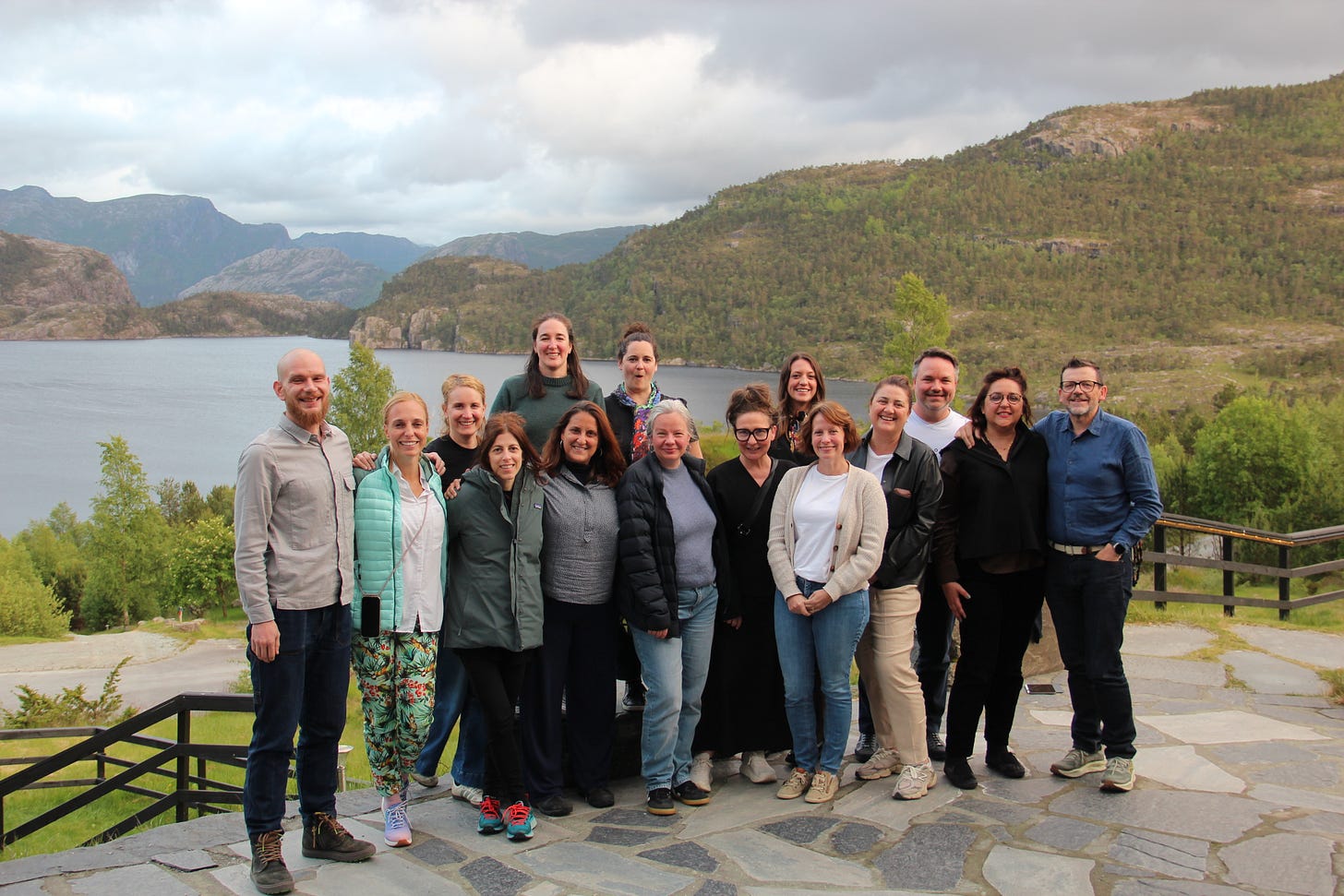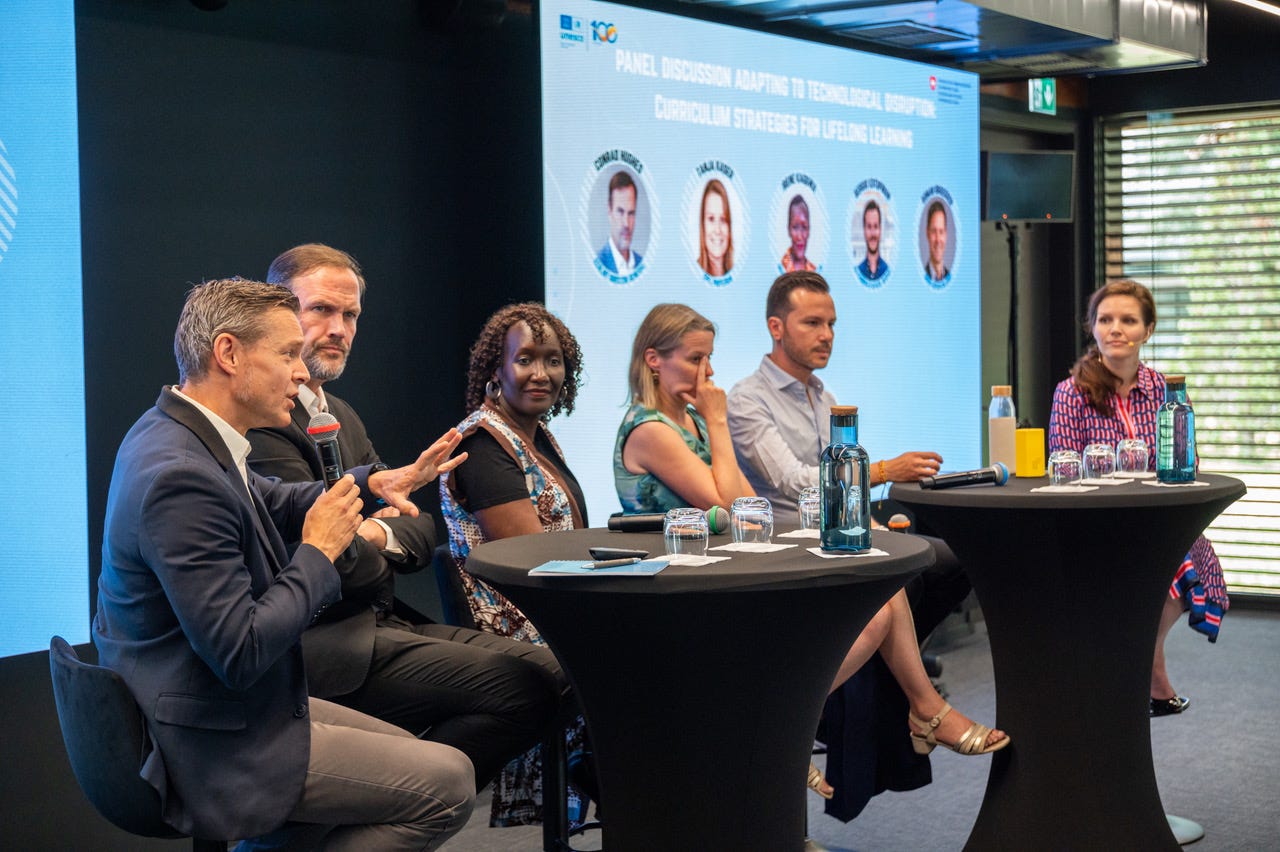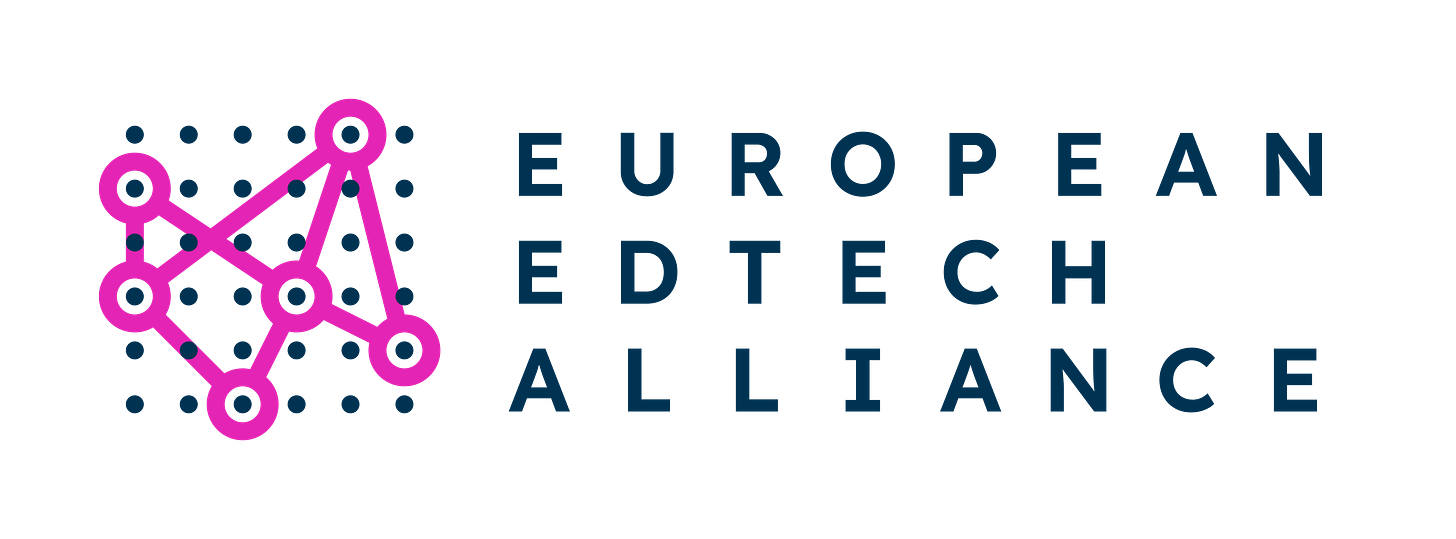Will Europe Choose to Sustain Its Own EdTech Future?
Across Europe, we see remarkable innovation and an industry impacting millions of people: EdTech founders committed to solving local problems with integrity and a commitment to European values. Yet, around them, associations and support structures are struggling to survive. Some EEA members have lost half their communities; others are facing the real possibility of closure.
The erosion of this ecosystem isn’t due to a lack of talent or ambition, or even fragmentation, but rather to a lack of coordinated action.
At the recent Digital Education Stakeholder Forum, Roxana Mînzatu stated: “EdTech is the oxygen of society,” and suggested digital education was as important as the Finance or Security sectors. But where are the policies and public investments to ensure that oxygen continues to flow? European EdTech is being pushed to the margins - not due to irrelevance, but a lack of support. There are no dedicated funding mechanisms, no scaled testing environments, no meaningful public-private frameworks. Meanwhile, the digital public space becomes increasingly shaped by external actors whose values are not our own.
Technology is not neutral. It reflects the systems and cultures that create it. If we want education technology grounded in European values, we must build and sustain it here.
We are at a decision point and every action counts. Every stage we give, every procurement decision we make, every call we fund—or don’t. Will we back European-grown solutions, or continue to cede the space, often, as we saw at the Commission’s own forum, to innovations from the United States?
There is still time to build the ecosystem we need. But it requires bold, coordinated effort—now.
Beth Havinga
European EdTech Alliance
EEA Announcements
Launching the EdTech Funding Database, Europe.
As part of our redesigned European EdTech Maps environment, on the 1st of July the EEA launched the beta version of our EdTech Funding Database, which offers:
✅ funding opportunities especially for EdTech organisations
✅ A fully filterable data base to tailor your experience
✅ A growing database of opportunities for funding and collaboration
You can access the database if your organisation is listed on the EdTech Map or ask your local member of the European Edtech Alliance for your special code
This initiative is made possible with the support of the Jacobs Foundation.
Female EdTech Fellowship: Extended call for Early Stage programme
To accommodate summer schedules, the dates for the next Early Stage Fellowship has been moved to 7. August - 30. September 2025. The 8-week fully online programme supports early-stage female founders building EdTech solutions across Europe.
Explore full details and apply by July 11th on the FEF website.
Europe’s EdTech Sector: Reflections after board and team off-site
This month brought together the EEA board and Team in a first joint off-site meeting. Jannie Jeppesen, Chairwoman of the European EdTech Alliance, has summarised some of the key issues raised during this meeting in a timely editorial stating that Europe's struggling EdTech sector reflects a deeper crisis in educational policy priorities during turbulent times when education has become central to resilience and competitiveness.
While basic literacy and numeracy decline across Europe and digital skills gaps widen, education budgets face cuts and digital tools are being banned under simplistic "screen time" debates. Jeppesen emphasises that EdTech isn't the complete solution but is a crucial part of addressing educational challenges. Read the “EdTech from and for Europe” editorial here.
EEA Project Updates
EmpowerED Startup Mini-Summit
The 4th annual Startup Mini-Summit kicked off London EdTech Week 2025 on June 16th, bringing together over 100 European EdTech innovators, investors, and entrepreneurs. Organised by techUK, UCL, AWS, the European EdTech Alliance, and EU-funded project EmpowerED, the event focused on strengthening Europe's EdTech startup ecosystem.
The European EdTech Alliance presented five key "building blocks" for accelerating EdTech growth across Europe:
💡Establishing a common definition of EdTech
💡 Aligning strategic governance and policy
💡 Building innovation infrastructure
💡 Creating smarter funding mechanisms
💡 Developing evidence-based trust standards.
🌐 Read the event summary here.
EEA in Action
European Commission Expert Group meeting on DEC
The European Commission’s expert group on Digital Education Content (DEC) met for the last time this month to review the final draft of the upcoming guidelines for Digital Education Content targeting educators and school leaders. Represented by Beth Havinga, Albena Spasova (EdTech Bulgaria), and Pierre Laborde (AFNIEF), the EEA members supported the group’s commitment to inclusive, high-quality, future-ready digital learning environments.
Almedalen Political Festival, Sweden.
At a seminar at Sweden's political festival, Almedalen, Finland’s Minister of Education Anders Adlercreutz, emphasized the urgency of a national AI strategy for schools to prepare young people for the future. He warned that having no strategy is a risk in itself. The panelists, our chair Jannie Jeppesen, the Swedish Teachers’ Unions chair, students and researchers agreed: AI must be integrated thoughtfulls, supporting learning, not replacing it. The Minister also highlighted the importance of including humanities and the arts alongside STEM to foster well-rounded individuals.
Who leads in digital education? Webinar
The European EdTech Alliance, represented by Board Member Alicia Berlanga, contributed to a high-level discussion titled “Who leads in digital education? Lessons from PISA, PIAAC and TIMSS”, organised by the European Digital Education Hub.
The webinar drew from international datasets (PISA 2022, PIAAC, and TIMSS) to assess how systems responded to the digital challenges of the pandemic. Read here for a full report on the webinar and the importance of avoiding simplistic narratives.
Reimagining Curriculum in the AI Era, UNESCO IBE, Switzerland
Roman Bruegger, Managing Director of the Swiss EdTech Collider, represented the EdTech sector at the UNESCO International Bureau of Education Symposium “Reimagining Curriculum in the AI Era: Innovation at the Centre of Education” in Geneva. In his remarks, he underscored the pivotal role of local EdTech ecosystems in driving bottom-up innovation, showcasing how grassroots initiatives that unite EdTech startups, schools, and learning scientists can create meaningful and sustainable transformation in education.
EU EdTech Policy
Digital Education Stakeholder Forum, Belgium
Under the title of ‘European EdTech: Time to Grow (up)!’ the EEA’s Beth Havinga joined Georgi Dimitrov (DG EAC, European Commission), Letizia Sbabaro (WeSchool) and Nanna-Louise Linde (Microsoft), to discuss the state of the EdTech ecosystem. The panel explored what is currently holding the ecosystem back and what is needed to ensure its sustainable success.
Ecosystem thinking emerged as an important issue with Beth mentioning the need to truly understand all sides of the ecosystem - that Skills programmes like Girls Go Circular are vital, but with only 3% of female founders in Europe receiving funding, welcoming women into STEM means little if the system doesn’t support them once they arrive. The topic of digital sovereignty exposed different understandings of what it meant to have an innovation-rich and resilient European education space. Importance was placed on recognising that the responsibility of supporting local environments is on all of us.
We thank DG EAC for their continued support of these important discussions and for driving topics of sustainability and growth for EdTech within Europe.
Council of Europe & EEA Webinar
“Europe needs a framework that is conducive to innovation and that fosters education technologies.” -Ahmet Murat Kiliç.
On the 17th of June, the EEA co-hosted a webinar with the Council of Europe on how evaluation frameworks can strengthen trust in EdTech innovation.
Speakers included Beth Havinga (EEA) and Ahmet Murat Kiliç (Council of Europe). The discussion explored the EEA’s report, Building Trust in EdTech: Exploring Evidence-Based Approaches, and the Council of Europe’s, Feasibility study for a European reference framework for the evaluation of educational technologies. Together we explored the need for multi-stakeholder frameworks that reflect national contexts and shared European values, the need to protect human agency and learner rights in AI deployment, and the value of flexible, reference-based models that serve diverse systems.
EmpowerED Policy surveys
As part of the EU-funded EmpowerED project, the EEA is compiling a final report to guide policymakers across Europe. This will address issues of funding gaps, fragmented procurement issues, a lack of testbeds and limited access to reliable data. Your opinion counts - make sure that you take a few minutes to share your experience.
📝 5-minute survey on funding realities
https://fje0ieoadu7.typeform.com/to/DI3Yd6MC🔍 4-minute survey on testing and evaluation
https://fje0ieoadu7.typeform.com/to/iSUfvlGU📦 3-minute survey on procurement and scaling
https://fje0ieoadu7.typeform.com/to/TUhBmYh3
EEA Community
EdTech Summit Hungary
On 13. June 2025, EEA member, EdTech Hungary hosted the EdTech Summit in Budapest, with contributions from EEA members from Hungary, Poland, Spain, Sweden and beyond. Discussions spotlighted key topics such as critical themes like smartphones in schools, AI in classrooms, and learner well‑being.
During the EdTech Trends roundtable, EEA members urged a shift toward ethical, outcome‑driven innovation and stronger alignment between national and European strategies. A video message from EEA Chair Jannie Jeppesen underscored the long-term responsibility of ensuring technology continues to support, rather than distract from, educational goals.
🌐 Read the full recap from our community manager, Antonia Götte-Ortiz, here.
Member Spotlight: DOHE
As a proud member of the European EdTech Alliance, DOHE has supported over 140 early-stage EdTech startups in 52 countries since its launch in 2023, building a more connected, inclusive and informed global EdTech landscape.
During London EdTech Week 2025, DOHE co-hosted two high-level events:
Redefining Learning Forum (with techUK)
A roundtable exploring how policy, funding, and innovation can support EdTech.EdTech Together - London (with MindCET)
A cross-border discussion on international scaling and cooperation.
Coinciding with these events, DOHE launched the Global EdTech Resource Map, a freely accessible platform aimed at helping stakeholders visualise, connect and collaborate across regions.
Ecosystem Opportunities
Call for EdTech solutions
UNICEF, the Finnish Ministry for Foreign Affairs, ARM, and the Asian Development Bank are seeking evidence-backed EdTech solutions to help tackle the global learning crisis.
Get evaluated through the EdTech for Good Framework to be listed on the Learning Cabinet and unlock growth opportunities across the global south.
The EdTech for Good Framework evaluates and curates safe, impactful EdTech tools. Five pillars ensure excellence in learning: safety, impact, design, reach, and equity.
🗓️ Deadline: 31 July 2025! | 🌐 Submit your application here.
Save the Date!
July 8th-11th: AI for Good Global Summit, Switzerland
September 10th: Nordic EdTech Summit in Malmö, Sweden
September 17th-18th: Learning Conference (L&D and HR), Stockholm, Sweden
Check out our members’ newsletters
This newsletter is written and produced by the European Edtech Alliance. The European Edtech Alliance is a consortium of national trade associations and clusters working with founders and providers of education technology (EdTech), to support the domestic and international growth of these businesses and the innovations they represent. European EdTech News is a reader-supported publication. To receive new posts and support our work, consider becoming a free or paid subscriber.








